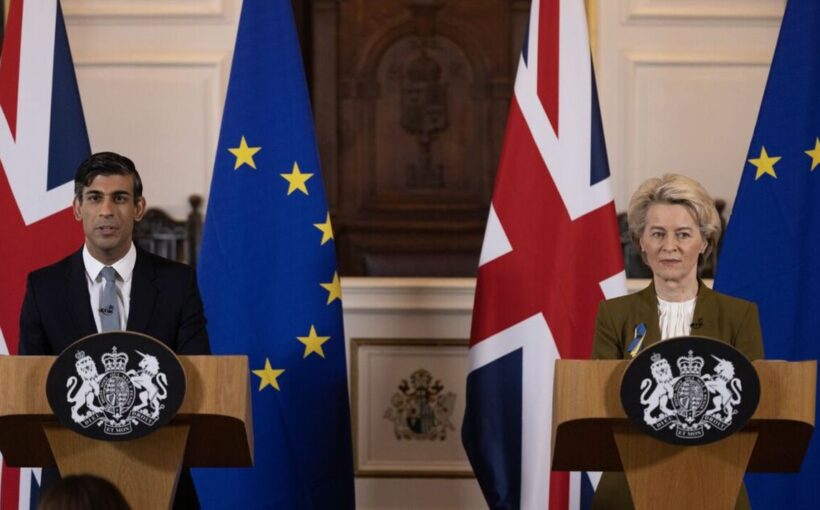Rishi Sunak says companies are ‘queueing up’ to invest in NI
We use your sign-up to provide content in ways you’ve consented to and to improve our understanding of you. This may include adverts from us and 3rd parties based on our understanding. You can unsubscribe at any time. More info
The first legal opinion from Northern Ireland has said that Rishi Sunak’s Brexit deal fails in its main objective of protecting Northern Ireland’s place in the United Kingdom. The Centre for Union report is the first serious independent legal opinion and includes the thoughts of former Northern Ireland Attorney General John Larkin KC.
It comes as the European Research Group (ERG) of Tory Brexiteer MPs have also asked their “star chamber” legal team of constitutional experts headed by Sir William Cash to look at the Windsor Framework in a move which could trigger a Tory rebellion when the framework comes to a vote.
Meanwhile, the Democratic Unionists (DUP) are also poring over the details before giving their verdict which will be vital in allowing the Northern Irish Executive to restart.
Mr Sunak has given the different parties two weeks to allow them to properly digest the details and come to a verdict before a vote.
But this first legal opinion suggests that he has failed in his main objective of ending EU rule in Northern Ireland.

The Centre for Union think tank includes DUP MP Ian Paisley Jr, son of the party’s founder, who has already spoken out against the Windsor Framework.
But damning conclusions signed off by the report underline the problems which could see politicians turn against the deal.
Mr Larkin says: “It follows from the foregoing discussion that the questions asked of me receive the following answers:
“1) Are the proposals contained within ‘the Windsor Framework’ compatible with the Acts of Union 1800, particularly Article VI thereof? No.
“(2) Do the proposals contained within ‘the Windsor Framework’ remedy the ‘subjugation’ of Article VI of the Acts of Union 1800? No.
“(3) Do the proposals in ‘the Windsor Framework’ strengthen the constitutional guarantee respecting the constitutional status of Northern Ireland? No.”

The report does praise the deal in part, describing it “as a significant step forward” from Boris Johnson’s Protocol.
It notes: “We believe the WF represents a significant and fundamental change to the Protocol. It is a significant step forward, and provides a new framework within which a solution could, with some necessary improvements, be arrived at.”
But it warns: “However, in and of itself it does not represent that solution.”
Crucially, the report goes on: “We have concluded, supported by the independent opinion of John F. Larkin KC, that the WF, as presently constructed, does not restore and fulfil the Acts of Union 1800.
“It, therefore, fails to satisfy the first of the Democratic Unionist Party’s (‘DUP’) seven key tests, or indeed the joint-unionist declaration signed by all unionist leaders on Ulster Day 2021.”

Addressing the main safeguard in the deal for Northern Ireland, the report concludes it could be “impotent”.
It said: “While we welcome the Stormont Brake concept, there is a risk that it becomes impotent or merely symbolic due to the process deployed.
“We recommend robust unionist engagement in the development of the relevant legislative provisions, which- in truth- will provide greater clarity on the ultimate utility (if any) of this mechanism for unionism. We ultimately reserve judgment until we see the final legal text of the necessary amendments to the NI Act 1998.”
There was also strong criticism of a lack of engagement on the specifics with the Unionist community before the deal was unveiled.
“We note there has been no engagement, whatsoever, on the substance of the DUP’s seventh key test; namely ensuring the principle of consent (Section 1 (1) NI Act 1998) operates to guard against any diminution of NI’s constitutional status (such
as that which was imposed by the Protocol).”
Source: Read Full Article
